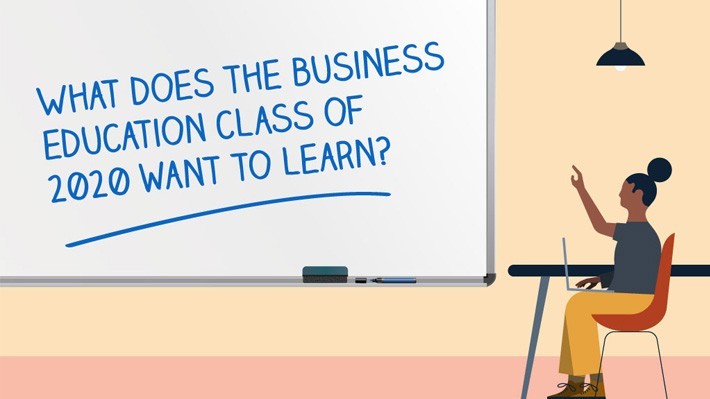Trends, tips, and best practices
What does the business education class of 2020 want to learn?
If you ask most higher education marketers to describe what they’re marketing, they’ll probably tell you about the courses they need to fill. This is perfectly reasonable. Course places are the bottom-line objective for business schools. However, if you ask the people who’ll be filling those business school places what they would like to learn, you’re likely to get a very different answer. That’s because most of these further education students don’t start their journey thinking that they need a particular course – or even a particular qualification. They start their journey thinking that they need a particular combination of skills. If business schools are to thrive in a new era for higher education, they need to develop, package and communicate their product in the terms that their target audience thinks about that product. This will require fresh thinking that’s guided by fresh sources of insight. LinkedIn recently partnered with the educational research specialist CarringtonCrisp for an in-depth study of the evolving higher education market that highlights key changes in how people invest in learning. Rather than front-loading this investment at the start of their careers or prior to entering the workplace, future students are adopting lifelong learning strategies. They de-risk their investment by stacking shorter courses into new types of qualifications, and building their choices around the skills they need at a particular moment. All of which raises a crucial question: what skills do people in the market for business education want to learn now? Answering this question effectively involves recognising that the market for business education involves several different types of buyers. In the era of lifelong learning, the motivations and priorities of prospective students change according to the stage they’ve reached in their lives and careers. What also changes is the influence of their business on their learning choices. Skills development is a business imperative, and C-suite and HR decision-makers exert powerful influence over the courses their employees will take – especially when those courses are funded from their Learning & Development budget. CarringtonCrisp’s Executive Education Futures report, published at the end of 2018, found 51% of employers planning to increase their spending on executive education and a further 44% maintaining a constant level of investment. Accessing the full market for further education means targeting and marketing to all of these potential investors in it. Doing so effectively will require schools to tailor their messaging – and match the courses they have to offer to the particular skills that these different investors prioritise.
The business agenda – developing data and people skillsAnalysis of LinkedIn hiring data enables us to identify the skills that are most highly valued by businesses, and that key decision-makers are therefore prepared to invest in developing. These fall into two categories: foundational Soft Skills that are crucial to every professional’s development and are fundamental to the ability to get things done – and more specific Hard Skills that relate to the requirements of a particular role. Demand for Soft Skills is relatively stable, although we have been able to detect signs of a shift towards more people-oriented skills at the expense of task-oriented skills such as Time Management. The Top Five most valued Soft Skills in 2020 are:
Demand for Hard Skills is more responsive to trends and new developments, with a notable recent shift to analytical and data-centred skills. The rapid rise of Blockchain, which entered the list of most sought-after skills in top spot this year, reflects the disruptive effect of new technologies. The Top Ten most valued Hard Skills in 2020 are:
Communicating the value of courses in terms of these Hard and Soft Skills helps education marketers speak directly to the agendas of people controlling executive education budgets. This becomes even more powerful, when you can also develop tailored messaging to fit the priorities of people looking to develop their careers.
Generation Z – enhancing skills today for a more purposeful role tomorrowThe immediate focus of the most recent generation to enter the workforce is building their employability. It’s therefore no surprise that the skills they’re most focused on are also among the Hard Skills that businesses prioritise. In LinkedIn and CarringtonCrisp’s analysis, Gen Z’s priority learning topics for the coming year include data analytics and data-driven decision-making alongside personal negotiation and communication skills. When it comes to priorities for the next five years, members of Gen Z anticipate improving productivity and operational efficiency, but also exploring the intersection of strategy and social impact.
Millennials – stepping into leadership with a strategic mindsetCommunication skills matter to Millennials too. Over the next year though, they are less likely to focus on persuasion and data analytics, and keener to learn about leadership. Over the next five years, they aspire to add strategy, strategic marketing and the ability to manage across cultures – anticipating a growing role within their organisations.
Generation X – creative thinking, digital transformation and business developmentCommunication and leadership skills remain important to Gen X’ers – and their immediate learning priorities for the next year match those of Millennials. When we look at their focus for the next five years though, new skills and new topics emerge. Digital transformation tops the list of topic areas that Gen X needs to understand, closely followed by an interest in creativity and design thinking that matches the Soft Skills prioritised by business. As this generation settles into more senior roles, they are looking to upskill on strategy, innovation, risk management and business development over the next five years.
Baby Boomers – safeguarding legitimacy through digital transformation and innovationFor Baby Boomers, upskilling around digital transformation and innovation are immediate priorities that dominate their learning choices over the course of the next year. They recognise that their professional credibility depends on keeping up with change and maintaining their ability to lead – and this is something that both themselves and their businesses are ready to invest in.
Any marketer has a greater chance of engaging attention and generating demand when they match their solutions to their audiences’ priorities and needs. Education marketing is no different. When the way that people think about learning shifts, the way that we market learning has to shift too. Understanding the skills that learners and their employers are prioritising now is a great place to start. |
Related articles



